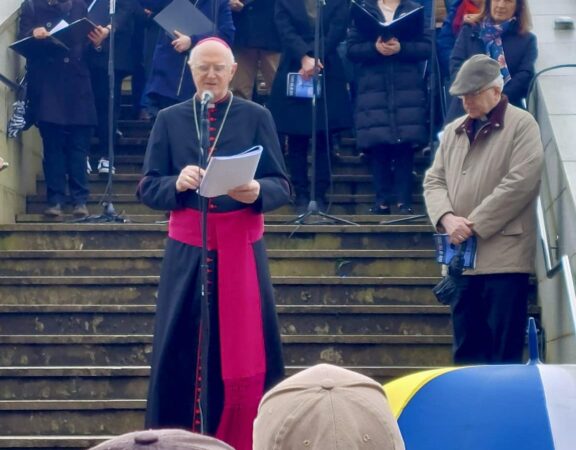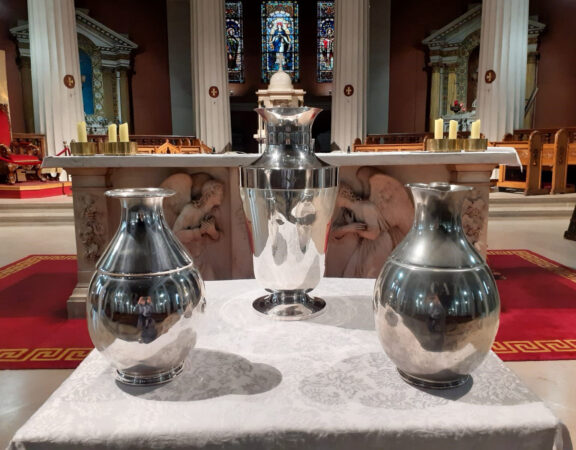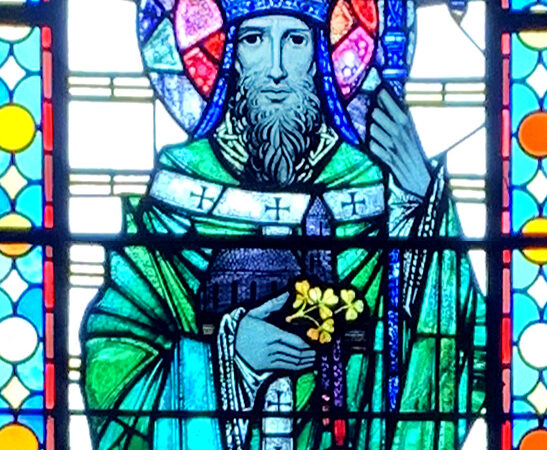SIMBANG GABI MASS 2017
Homily notes of Most Rev. Diarmuid Martin Archbishop of Dublin
Church of Saint Mary of the Angels, Church Street, 15th December 2017
“I am delighted to have this opportunity to be with the Filipino community in Dublin and to begin the final preparations of the great Feast of Christmas at this Mass with you.
The Filipino community has evolved here in Ireland over these years and you play an important role in the Catholic Community of the Archdiocese of Dublin and indeed within Irish society. Your kindness and spirit of service and your deep faith are renowned and much appreciated.
I greet you as a community that keeps alive the best in your own traditions and I know that you also try to pass on these traditions to your children. You wish to keep alive in your homes and in your communities the special Filipino celebrations for Christmas.
One of my staff told me of the invitation to be with you these evening and he said it is something called “Misa de Gallo – Simbang Gabi Mass”. He wondered what that meant. It was easy for me to explain what the celebration was about as I attended the Misa de Gallo in the Cathedral of Manila in 1978 – almost 40 years ago – before many of you were born.
I was a guest of Cardinal Sin, the Archbishop of Manila, and he was very pleased to welcome me by saying: “it is probably the first time you have celebrated Christmas in the house of sin”.
It was a wonderful experience. Naturally, everyone wishes to be at home for Christmas and I am sure that many of you would also love to be at home with your family this year. It is good however that you can celebrate something of family and tradition here in Ireland.
Our Gospel reading talks about the great figure whom the Church recalls in our preparation for Christmas: John the Baptist. Who was John the Baptist?
John is one of the few figures of the New Testament whose name is mentioned even by the secular historians of his time for the enormous impact that he had on society. Extraordinary crowds, from every level in society, went out to see him in the wilderness. His preaching created an acute awareness that something new and significant was about to take place.
John’s message was not preached in the conventional places of religious worship or administration. John stood out as someone radically different and who challenged convention. He did not preach a safe, comfortable, politically correct religion. John was not to be found in the comfort of the centres of power nor could his message possibly ever have been transferred to such a world. It was the obvious integrity of his life-style and of his message that generated repentance; that same message also generated fear and apprehension among others. John placed his hearers before a choice.
John appears in the wilderness. His message is something new. It is not simply something added on to existing piety and practice. John’s message announced that something completely new was about to break into human history, which would require his hearers to repent their ways and look at their lives in a new way.
We live in a world that so often self-defines itself and its values. Those who have a message to bring or an image to build or correct carry out surveys which try to tell us what we think; they turn to spin doctors who try to shape what we should think; they sell their stories in such a way that they fit into and are supported by the sentiment of the moment. What is the result: the spin very often wins the day and we begin to think as others wish us to think. However, that spin lasts only until the day when it is decided by someone else that the spin has to go in a different direction.
John teaches us another way. A precondition for any kind of personal religious renewal or renewal in the Church is that we like John must first go into the wilderness. We have to take a step away from the flavour of the day. We have to ask the questions that bring us towards a deeper understanding about life and about who we really are. It is only in the wilderness that we can make a judgement and discernment about the conventional wisdom of our times. Even in our own times, like those who went out to see John we are called to leave behind the conventions of the day, the comfort of our ways and our securities, and go into the wilderness, back to the primitive simplicity of life, with all its risks.
That John’s message required discernment about the model of everyday society is evident in John’s own life-style. His clothing, his food, his habitat are radical in their simplicity. Through his own life, he is telling his hearers and us that if we want to be able to appreciate the new times that will come with Jesus then we have to detach ourselves from every form of superficiality, in our daily life but also in our religious piety.
John makes it clear that the one who is to come will baptise in the spirit. This means that he would require of his followers not a religion of outward observances, or empty spin, but a radical style of integrity of life and sincerity.
John witnessed to the truth. He did not place himself centre stage. He told his hearers that one was coming who was greater than he was. Those who took his testimony to heart were those who welcomed Jesus. Others moved by the great interest in John never managed to grasp fully what he was preaching. As we prepare for Christmas, we too have to ensure that we do not get trapped in the business of the preparation of things, but that we allow our hearts to reach out for that someone, Jesus Christ, who is the way and the truth for our lives and for that true happiness which for ourselves and our children as we celebrate the great Feast of the birth of Jesus.









